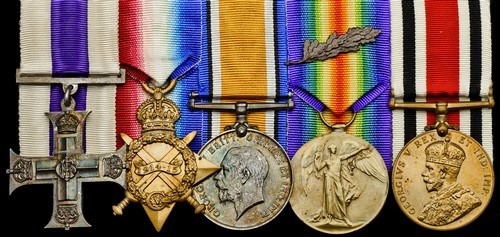
Auction: 13003 - Orders, Decorations, Campaign Medals and Militaria
Lot: 13
A Great War 1918 'Egyptian Expeditionary Force' M.C. Group of Five to Lieutenant-Colonel P. Forrester, Honourable Artillery Company
a) Military Cross, G.V.R., unnamed as issued
b) 1914-15 Star (223 B.S. Mjr. P. Forrester. H.A.C.)
c) British War and Victory Medals, M.I.D. Oakleaves (Major P. Forrester)
d) Special Constabulary Long Service Medal, G.V.R. (Asst. Cmdr. Philip Forrester. (Lt. Col.) M.C.), edge bruise to BWM, very fine or better, mounted court style as worn, together with three photographs of the recipient (5)
M.C. London Gazette 24.8.1918 T./Capt. Philip Forrester, R.F.A.
'For conspicuous gallantry and devotion to duty. He commanded his battery with great skill and dash, galloping into action close up to the firing line. He directed the fire of his battery throughout the action, standing in an exposed position under heavy rifle and machine-gun fire. He showed splendid coolness and skill.'
M.I.D. London Gazette 12.1.1920 Forrester, T./Maj. P., M.C., Royal Horse and Royal Field Artillery
'For distinguished and gallant services with the Egyptian Expeditionary Force'
Lieutenant-Colonel Philip Forrester, M.C., was born in Beckenham, Kent, in 1878, the third son of the Hon. Frank Woodhouse Forrester, and was educated at Harrow. A keen Territorial, he was admitted to the Honourable Artillery Company, 29.11.1909, and soon made his mark as an efficient gunner. As one of his contemporaries observed, 'He was always a fearless and finished horseman, a qualified gun-layer, an excellent signaller, and, incidently, by no means an inefficient trumpeter.' Promoted Corporal in 1911, and Sergeant the following year, he was advanced to Battery Sergeant-Major of 'B' Battery in January 1914.
'On the outbreak of the Great War, Forrester at once volunteered for active service, and sailed with his Battery to Egypt in April 1915. Both during the training period and on active service he carried out the onerous duties of Battery Sergeant-Major with the greatest energy and efficiency, happily combined with tact and good humour, and those who served with him will not readily forget his unfailing cheerfulness and kindly care for his men during the hardships of the Aden campaign. Such a man was of necessity singled out for further promotion, and on the establishment, in October 1915, of a gunnery branch at the Imperial School of Instruction, Forrester passed with ease through the necessary course and gained his Commission.' (The H.A.C. in the Great War by Major G.G. Walker, D.S.O., M.C. refers).
Commissioned Second Lieutenant in the Royal Artillery, 7.11.1915, Forrester was then retained as an assistant Instructor at the School, before being promoted Captain, 25.2.1916, and placed in charge of the Gunnery School: 'Here he remained for nearly a year, while hundreds of candidates for commissions, including many Australians and New Zealanders, passed through his hands. A course for Officers and senior N.C.O.s was also started, and soon there were few gunner officers in Egypt below the rank of Major who had not received and profited by instruction in gunnery from the erstwhile B.S.M. of 'B' Battery, H.A.C.' (ibid).
When the Egyptian Expeditionary Force advanced across the Sinai desert into Palestine at the end of 1916, Forrester felt impelled to take a more actively combatant part in the campaign. He therefore asked to be relieved of his duties at the School, and was posted as Captain to a Field Battery, which he served with distinction, and was awarded the Military Cross. He then served for a time as Staff Captain to Colonel the Marquis of Exeter, who was then commanding the 19th Brigade, R.H.A., consisting of 'A' and 'B' Batteries H.A.C., and the 1st Notts, R.H.A. From there he was posted to the command of 'B' Battery, 261st Brigade, R.F.A., in the 52nd (Lowland) Division, which he commanded till the end of the War, being transferred with his Battery to the 7th Indian Division when the Infantry of the 52nd Division were sent from Palestine to France.
On the reorganization of the Territorial Army after the War, Forrester was transferred to the Territorial Army with the rank of Major, 28.7.1920, before being posted to 'A' Battery, H.A.C., which he reformed and commanded with signal success. When the H.A.C. Division of the Metropolitan Special Constabulary was formed in 1920, Forrester was one of the first to enlist, ultimately serving as Assistant Commander. In November 1926 he was promoted Lieutenant-Colonel and given the Command of 11th (H.A.C. and City of London Yeomanry) Brigade, R.H.A. He died at home in Hampstead, 5.1.1929. His family presented some silver to the H.A.C. after his death in his memory.
Subject to 20% VAT on Buyer’s Premium. For more information please view Terms and Conditions for Buyers.
Sold for
£1,200




